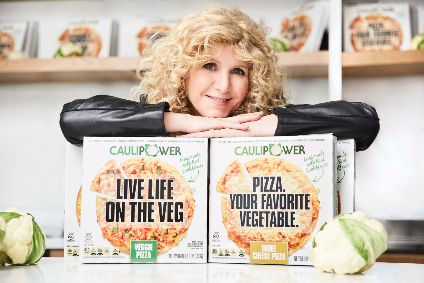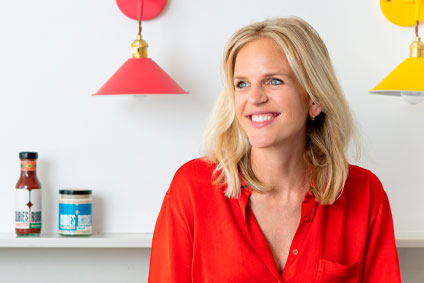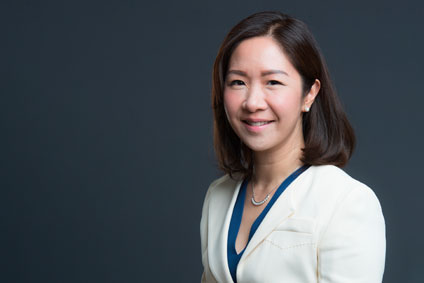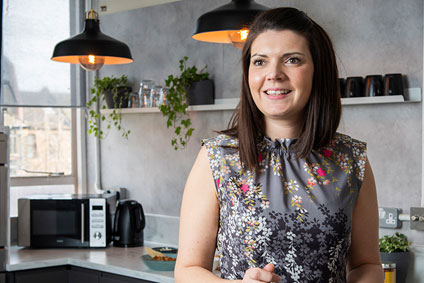just-food’s Dean Best speaks to four female entrepreneurs to hear what they’ve learnt on their journeys so far and what advice they have to others wanting to start their own food businesses.
“Only 3% of venture dollars go to female-founded businesses. That’s extraordinarily disheartening” – Gail Becker, founder and CEO of US frozen-foods firm Caulipower.

Discover B2B Marketing That Performs
Combine business intelligence and editorial excellence to reach engaged professionals across 36 leading media platforms.
From an outsider looking in – because it wasn’t that long ago I was an outsider and knew nothing about the industry – I did expect there to be more women. I was a little surprised by that, particularly so in manufacturing. It’s changing and certainly not none but, relatively speaking, I was surprised by the lack of women in manufacturing,
In the period between when I decided to start Caulipower and when I launched, I made the decision not to tell people what I was doing. I probably did that because I was afraid that people would say ‘What do you know about food?’
There was one time in particular, when I wasn’t too far down the line, not long after I started the company, where I thought I was going to turn back. It was a really, really challenging day with lots of roadblocks and I wasn’t sure that I could do it. I called a few people in my universe and all of them said I could do it. I don’t know what would have happened if they didn’t.
I have found tremendous support, friendships and kinship with other female founders, particularly in food but all over. I started this thing a couple of weeks ago on my Instagram and LinkedIn called Female Founder Friday. I highlight female entrepreneurs and brands that I’ve come across that I just really like. I’ve done three so far and I love it.

US Tariffs are shifting - will you react or anticipate?
Don’t let policy changes catch you off guard. Stay proactive with real-time data and expert analysis.
By GlobalData
The only way to see more female-founded companies and businesses is to support more female-founded companies and businesses, to buy each other’s products, to cheer each other on, to sign up for their newsletters and share their stories on social media.
I can’t speak for globally – and this isn’t my words this is just fact – but only 3% of venture dollars go to female-founded businesses. That’s extraordinarily disheartening. One of the reasons I try and talk about Caulipower is I hope Caulipower represents that female-founded companies are a great bet.
I do think it’s harder for us to find money. Early on, people were like, ‘I don’t know. I need a little bit more data. I need to see how you’re gonna do. I don’t know about cauliflower crust pizzas.’ I don’t know if that would have all happened in the same manner if I were a male. Maybe it would have, maybe it wouldn’t have but I can tell you it’s definitely been challenging.
There are so many wonderful new funds started by women who invest in women-founded companies, which is fantastic. One day I would love to do the same. I think it’s tremendous but it’s the exception not the rule.
One of the reasons I left corporate America is because I wanted to create the kind of work environment that I wanted to work in and, quite frankly, I knew I couldn’t find it in the corporate life. I actually had to leave and build a business and create it myself. It’s not the only reason obviously that I started Caulipower but it is a factor.
I don’t think I’m alone. I think a lot of women have felt that element was missing in corporate America and so they’re building these very dynamic and engaging businesses that not only do well financially and [are] making a real impact but also are doing a lot of good along the way.
I tend to say this wherever I go but the only thing I knew about food when I started Caulipower was I bought it, cooked it, made it. And so, if I could do it, so can other women. There’s not a lot of other industries that I find would be so welcoming of a newcomer on the block. By the way, a lot of the champions of Caulipower have also been men.
There’s been a number of female buyers and a number of male buyers really taking a bet on Caulipower and championing me and championing the brand. I will be eternally grateful for that.

“Be really brave and, if it fails, fail quickly. You’ll learn masses from what you’ve achieved” – Jenny Costa, founder of UK condiments business Rubies in the Rubble
When I started Rubies in the Rubble, so many friends were constantly being, like, 'Are you not scared? It's really risky. Are you not nervous it won't work?' There was less belief in something not working out and the fear of failure being quite big for females.
The main thing I noticed is the lack of role models. When you look up to business leaders generally, there's not many females to look up to. At Rubies, we get really excited by other female founders that have grown businesses or made a mark in the industry because it's setting more role models for the next generation to come, for people to think they can go for that job, become a CEO or start a business. Until we have that bank of role models so it becomes the norm, it's hard for females to dream that they would go into those positions as well.
I've heard it from friends in the past when people talk about the types of question you might get from investors, really drilling down on your cost pricing or how exactly it's going to work, compared to men raising investment who might be just asked 'Where's the big vision? What's the dream? Show us the blue sky.' They don't even question whether it's going to work. They assume it's going to.
I've never had anything like that directly or noticed it. Everyone's got natural biases and, until you get more people at the top making these decisions on business and making that an even playing field, you're always going to get natural biases coming in when people are making decisions.
On the other side of it, looking at our cap table, there's not many females invested and there's not many female investors out there. I don't know if it's a barrier to being excited about making investments personally and being a part of that conversation but we really struggle to find female investors. Until that changes, you're always going to have an uneven bias. You need the investors to be a mix as well as the founders be a mix. That's got to come hand in hand.
"You need the investors to be a mix as well as the founders be a mix. That's got to come hand in hand"
I think I'm very mindful when your tummy's sticking right out and you're trying to raise investment or build a business. It's not that attractive, just because of the sheer fact you're going to have to take some time out. I completely understand that. It's a hard fact that it's going to add a cost to the business but it's also nature and it's one of the privileges of being a woman as well, to be a mother.
I feel like I'm a very good multi-tasker and I think women are often better at juggling lots of different things. I don't know if we're just made that way. There's definitely a sacrifice as well for women who are very passionate and very ambitious in their career, there is a sacrifice that you will probably not be able to give quite as much time to your children as you would like and it's a choice I suppose you have to make.
Women have got different skill sets to men and probably different natural ways of driving a team or creating community, creating culture, creating an amazing working environment, getting the most out of people. I think it's very hard to stereotype because there are also amazing examples of both but, I think, in general, there's a lot of positivity about being a woman in business because, if you flip it on its head, you're one of a kind and there's not many female entrepreneurs or females at the top of businesses. When you are in that position, you stand out and people are keen to hear what you say.
If you're really passionate about something then go for it with all your heart, be really brave and, if it fails, fail quickly. You'll learn masses from what you've achieved in that time. You'll know why it failed and can move on. The main thing is to give it a go, start small, see if there's demand for the service or the product. You'll never know unless you do it. Life's too short to worry about the failing side. No-one knows the future.
 "The female half really has a lot of smart people and a lot of bright minds" – Carrie Chan, founder of Hong Kong-based start-up Avant Meats, which is developing cultivated-seafood products.
"The female half really has a lot of smart people and a lot of bright minds" – Carrie Chan, founder of Hong Kong-based start-up Avant Meats, which is developing cultivated-seafood products.
I come from a property or real-estate background, so I didn't have knowledge of science or the food industry. It was purely the desire to find that this technology is very interesting to replace animals – not just in food, but also, if you're vegan, you ask yourself whether these clothes, these shoes or this skincare product is vegan or not. That was basically the core objective when I started.
Honestly, I think that, interestingly, for these types of alternative protein, because everyone is very mission-aligned, they're not really in the old world of capitalism, to a certain extent. Investors are mission-driven, they do not think we should maximise profit in a way. They think we should try to find a balance between making a return and taking care of the environment.
In a way, it's a bit like a new generation of capitalism, where people have a spirit that's a bit more open-minded. It's not the old world where, you know, VCs or investors are just biased towards non-female founders. I am very grateful I have not really encountered – touch wood – a harsh environment when it comes to being a female founder.
The company now has ten people. There are only two female staff – me and a lead person – and then all the others are male. The reason why is that, to begin with, we don't have a lot of candidates in the field of studying bioprocessing. We actually made an offer to a female scientist to relocate to Hong Kong, she really liked the job but her partner found it challenging to relocate and find another job in another continent. She decided not to take up the role. It's a really personal situation but I would not be too surprised if we come across another scenario like that. To begin with, I think the number of people in this field is not a lot and maybe it does not attract a lot of female students. Maybe we do need to start from university education, etc., to improve the situation.
I think there have been statistics showing the number in China of female founders are actually in proportion, doing a bit better than in some other regions. My first reaction was to be a little bit surprised but I'm actually quite happy to have read that. I don't know whether I can attribute that partly due to the one-child policy in China. Of course, on one hand, that really makes the gender ratio not very balanced but, in cases that parents do have a girl as a single child, they give them all of the opportunities she would like to grow and get educated. In a way that might help in that sense.
Anyone who would really like to start something should just go ahead to do that – but I don't think that's related to gender. It can be challenging for both genders. There is someone I look up to and he actually started his start-up when his wife had a newborn baby. However, my message is potential female entrepreneurs may have a lot of ideas but you definitely need a lot of help from everyone, from family. It cannot be single-handed. That's very important. I've read that during Covid the household and home-schooling obligations have fallen primarily on the mum and less on the dad, so, my main message would not be only directed at females.
Gender around the world is half-half, right? The female half really has a lot of smart people and a lot of bright minds. We basically need everyone to help them. Innovation from mankind could develop better if we can unleash that 50% of the population. That will benefit everyone. They just need to be given help and opportunities to achieve that.

"We're way too hard on ourselves when things go wrong and we don't celebrate enough the wins" – Bay Burdett, founder of Bay's Kitchen, a supplier of low-FODMAP foods based in the UK.
Any gender imbalance in the industry didn't cross my mind until the time came where I wanted to raise investment and that was where I started getting nervous, thinking: 'Are people going to want to invest in a young female entrepreneur that has no food background experience?'
Luckily at the time, I actually had Ben [Haynes, non-executive director] involved by that point and, to be honest, I think it worked having both of us. It worked having a male and a female and it worked having his experience of the food industry, but me being a young, hungry entrepreneur that wanted to see this business grow.
And actually things are changing a bit. There are quite a few investors, and people out there, who want to invest in young women entrepreneurs. It's kind of becoming a bigger thing about being women in business, etc. I still to this day think I would've struggled on my own, maybe not so much the fact that I was a female, maybe more that I didn't have the food background that Ben's got. I don't know.
I think one of the biggest challenges of it all is, particularly for women, is confidence. Going for investment, you need to be confident and show them that you know your numbers, you know what you're talking about and you've got the confidence see it through, basically, and carry on and grow the business where you think it's going to go. I think men are just a lot better, even if they haven't got the confidence, they're a lot better at showing that they've got confidence than women are. If women don't have confidence, they struggle to pretend that they do.
We sat down with eight different investors, maybe six or eight investors. They were all very different. I think there was one female and the rest were all male, which is again, I guess, where my perception of going for investment is. My perception is all these high net-worth individuals and angels tend to be men that but, again, maybe that is because men go through risks more often and investing in a start-up business is very risky business.
If I was going to be really stereotypical – it depends on your food business – but women tend to have a better grasp on the family life and what's cooked for meals every day. Doing the food business I do, where we talk to a lot of people with intolerances and allergies, it tends to always be females who are looking for nut-free products because their son's got a peanut allergy, or they're looking for gluten-free products because their daughter's a coeliac. They're the ones going out looking for these products or meals to create for the family to encompass an allergy or intolerance, or multiple allergies quite often.
I feel like they connect better with female founders and we can talk about things like, 'What do you feed your kids?' Also having the condition myself and trying to follow a certain diet and knowing a lot of people that follow these kind of diets as well, it's being able to have that perspective with them, to understand what they're looking for and to listen to them as well.
Again, I'm being very stereotypical. Women are very good listeners and customers want to be listened to – but I think you need both sides and I think that's why Ben and I work so well together. We both bring different perspectives to the table. He reminds me that business is business at the end of the day and you have to make certain decisions for the good of the business, whether it's what you feel is right or not. From my perspective, I bring the other side, the female side, my perspective of what I think works best for our target audience, which is generally female.
You need bags and bags of resilience. The first few years are horrendously challenging. The roller coaster journey that I went on for the first at least two years, if not more, was incredible. There were a lot of times where I wanted to give up but you have to want it enough. You have to have that dream. My dream was to see my products on a supermarket shelf and I didn't want someone else to go and do it. I knew that they would. I knew there would be FODMAP products on a supermarket shelf at some point and I wanted to be the one that had done it. And so I kept going.
Entrepreneurs are way too hard on ourselves when things go wrong and we don't celebrate enough the wins that we have every week, when you get a new listing and things like that. You're so busy trying to sort out all the paperwork and everything you don't stop and think 'Wow, I've got a new customer' and celebrate that. Make sure that you appreciate everything along the way, particularly when it's good because you will know when it's bad.





